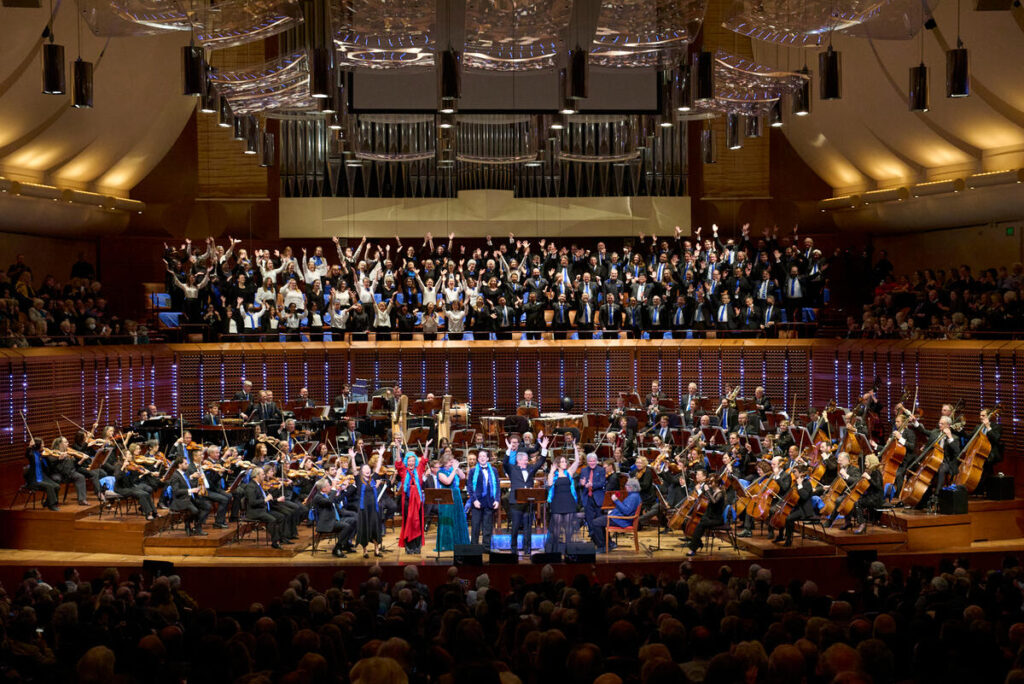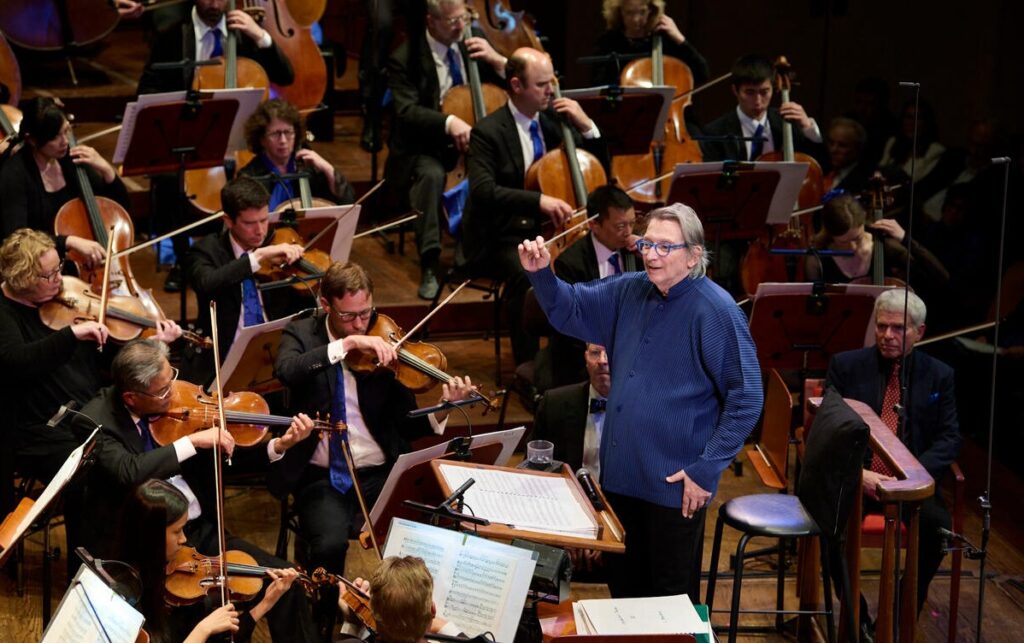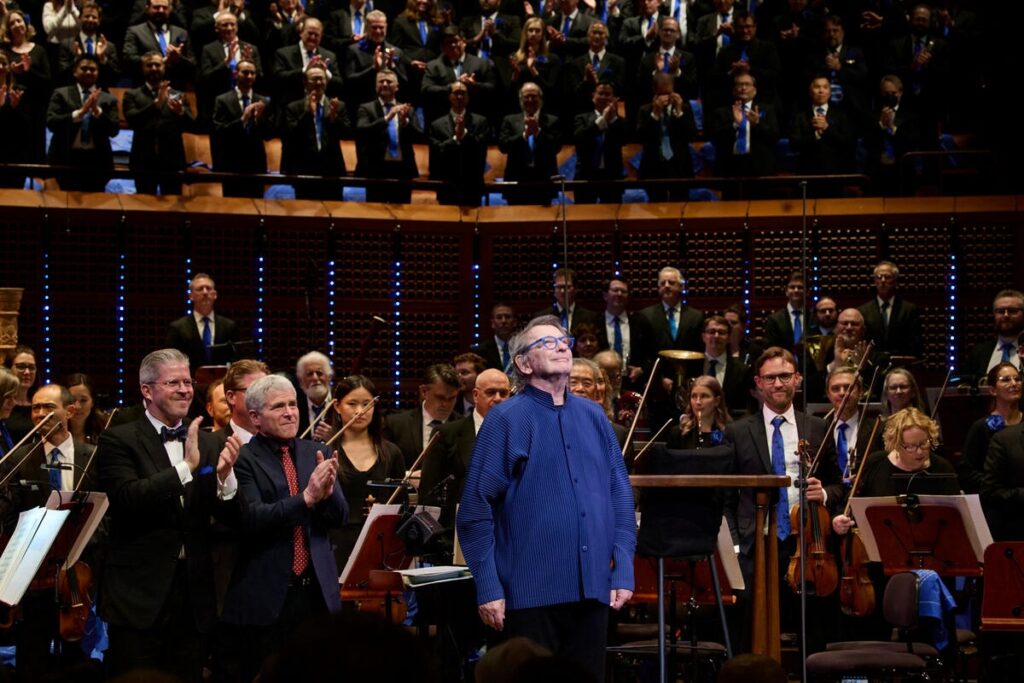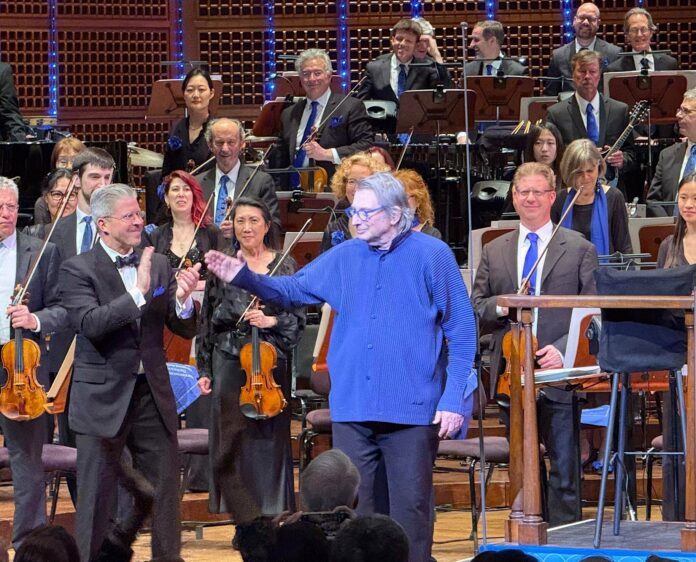Even after he retired as the San Francisco Symphony’s musical director for more than 25 years in 2020 and announced he had an aggressive form of brain cancer in 2021, Michael Tilson Thomas kept on trucking.
Though COVID and cancer treatment kinked his perpetually smooth musical strut, he still conducted in spots like Houston and his hometown Los Angeles, won a Grammy for his transcendent 2019 composition Meditations on Rilke, witnessed a street dedicated to him (MTT Way) in a star-studded ceremony, even popped back into SF last January to conduct Mahler’s uber-epic Fifth Symphony—a marathon excursion for any conductor, paying tribute to a mighty composer he’s championed throughout his career.
That Mahler was a bit of a nail-biter. MTT appeared from the wings frail and in need of assistance to step up to the podium, forgoing his trademark extended welcoming remarks and leaping straight into things. His superpower has always been polishing any piece up to a maximum sheen, producing a sound as clear and reflective as the cluster of acrylic acoustical panels hovering over the orchestra Davies Symphony Hall, as warm and rich as the oak paneling along its sides, as graceful and imposing as the floating concrete of its balconies. (Pietro Belluschi’s building has been an almost perfect analog for MTT’s aesthetic.)
Yet the first two movements of the Mahler were uncharacteristically unmoored. They’re turbulent enough already, but it was hard to get any bearings at all. Miraculously, MTT snapped things together during the time-stopping third-movement Adagietto—for my meagre money, the most beautiful piece of Western classical music written—and the next 30 minutes were an expert emotional and auditory experience, the maestro transcending his physical limitations to deliver a cherished work. It was light years beyond what we in the audience had any right to expect; only the triumph of his technique is allowing me to voice any criticism at all.



MTT at the dedication of MTT Way in December 2023
How awesome, then—even after he announced that his brain tumor had returned and he would be ceasing all performances after this one—that the MTT magic was again in full effect for the two pieces he conducted at his 80th birthday concert on Saturday at Davies Hall.
The bittersweet evening, a goodbye party and a goodbye party, was a thankfully light-hearted and touching showcase of his own compositions and some of his favorite pieces. It was book-ended by two larger works he conducted himself: Benjamin Britten’s brassy 1943 “Variations and Fugue on a Theme of Purcell, Opus 34” (composed for the documentary The Young Person’s Guide to the Orchestra and touching on MTT’s vast pedagogical work, including with the New World Symphony of young musicians) and Ottorino Respighi’s unnervingly rollicking 1928 “Roman Festivals.”
In between we were treated to rarely heard music hall pieces MTT wrote in the 1970s and ’80s, when he was clearly besotted with Sondheim: “Not Everyone Thinks That I’m Beautiful” sung by longtime friends Frederica von Stade and Sasha Cooke, “Drift off to Sleep” and “Answered Prayers” with charming baritone Ben Jones, and “Sentimental Again” with feisty Jessica Volk, who also popped off a sassy version of Frank Loesser’s “Take Back Your Mink” from Guys and Dolls, with members of the Symphony Chorus.

Adjacent to these were Debussy’s very transparently homoerotic “La Flûte de Pan,” sung knowingly by a game von Stade, and a poignant rendition of the 1912 “Overture from Khantshe in Amerike” by MTT’s grandfather Joseph Rumshinsky, a famous American Yiddish theater composer. (MTT is a descendent of the renowned musical Thomashefsky family.)
An immersive “Immer Wieder,” sung by Cooke, from his Meditations on Rilke, saw the early 20th century Austrian mystical poet’s haunting invocation of “the land of love, and the little churchyard with its mourning names, and the terrible, silent ravine into which the others dropped” set against a cosmic tone poem-like landscape, which could be an anguished lament for the AIDS years MTT and his coterie endured.
His mentor Leonard Bernstein’s “Finale from Chichester Psalms” invoked the—now seemingly more than impossible—urging of Psalm 133 to “Behold, how good and how pleasant it is for brethren to dwell together in unity.” The Symphony Chorus beamed right into our moral compass for that bit. And MTT’s “Grace,” written for Bernstein, was a surprisingly tender ode to the pleasures of a plate of good herring.
Ensconced in a velvet-covered chair with his partner of 40 years, Joshua Robison, by his side, MTT seemed to revel in each piece, conducted by Teddy Abrams and Edwin Outwater, and delight at the cute remembrances from each performer. At one point he raised Vosk’s voluminous pant leg to kiss her hem in gratitude. Each seat in the hall was bedecked with a scarf in his signature blue, matching the ties of the orchestra, the boas of the chorus, and strings of festive lights onstage, perhaps borrowed from rapper Common’s appearance at the Symphony a couple nights before.

If you stepped back a bit, the whole thing was maybe a bit mortifying: Here were a person’s friends singing lyrics like “we’ve reached the final inning, just as the fun’s beginning” back to the person who wrote them many years ago, as he faces his own final inning. But it was all subsumed in a classic Broadway “up and at ’em, show must go on!” attitude that carried things beyond the maudlin into the, well, realistic. That seems an especially gay way to face life, and death, and I’m here for it.
MTT has always contained fascinating dichotomies. He’s the most urbane, genteel of conductors who’s also never played it safe, keeping the fiery Bay Area tradition of experimental composers alive for ever-larger audiences. His constant programming of contemporary music giants, including his wondrous American Mavericks series, has helped keep names like Charles Ives, Ruth Crawford Seeger, Terry Riley, Carl Ruggles, Meredith Monk, Steve Reich, Harry Partch, and John Adams—who was there on Saturday—from dusty CD obscurity for avid listeners like me.
There is absolutely nothing punk rock about him, yet he gleefully smuggled anarchy into what could have been SF’s stuffiest institution. I’ve seen him make a fruit smoothie from scratch live onstage with soprano Jessye Norman, as part of a John Cage work, to delighted laughter (and only one walkout). The alchemical reaction to that was even the most familiar works in the canon sounded fresh and experimental in his hands.
An openly gay figurehead during one of the most momentous periods in the history of gay rights, championing queer composers and programming LGBTQ+ events, MTT is nevertheless one of the least politically outspoken San Francisco arts leaders I can think of. His sleek sound and voracious ear will historically go hand-in-hand with the slick grifting of SF’s corporate tech era, providing a vibrant counter-narrative, perhaps a losing one, to the rise of Silicon Valley fascism and the fall of the arts. People were filling Symphony seats to hear consciousness-expanding abstract compositions, electronic and otherwise, while technological conformity, crypto-greed, and surveillance state xenophobia raged outside.

Yet MTT has always preferred, I think, to “let the music speak for itself,” if such a thing is possible. Which is why his choice for what may surely be his final conducting moment was exhilarating and troubling. I loathe the popular corollary of our current US moment to the fall of the Roman Empire—not least because it’s been co-opted by right-wing assholes to decry diversity and tolerance. But it’s hard not to hear all the whiplashing cacophony, anger, violence, acclimatization to said violence, and sudden hits of dopamine pleasure of today in Respighi’s “Roman Festivals.”
That piece, part of a trilogy of meditations on Ancient Rome, summons the blood orgy of the Coliseum (the gladiators, the martyrs, the beasts, the thundering approval of the crowd) as well as the wild overstimulation of the Roman holidays, punctuated by sudden zones of languor and quietly lapping string figures. At one point a mandolin plays romantically through the turbulence, but—at least in MTT’s interpretation—wanders away, lost to the roiling rhythms of the brilliant percussion section. (The conductor banged his baton three times on the stand during this passage, which raised the hairs on the back of my neck.) As my husband perfectly put it, “It sounded like they sent a drone over the city.”
The future of the SF Symphony, and thus a huge part of MTT’s musical legacy, is precarious. His successor, Esa-Pekka Salonen, who was not in attendance that I saw, resigned when the symphony’s Board of Governors refused to fund his programming plans. Outside the hall, we were flyered by reps of the Musicians of the San Francisco Symphony union, who are in ongoing negotiations with that same Board of Governors for a fair contract. (Meanwhile, an ambitious, starchitect-driven Symphony Hall expansion is being pursued.) And despite sold-out nights like this one, and some continually exciting programming, the Symphony, like all institutional arts orgs, has been struggling to attract a younger and more diverse audience, as well as new donors from beyond the old money class.
Maybe none of that mattered while we were celebrating someone who has filled the city with fabulous music for so long. Whether or not I’m reading way too much into MTT’s final selection, it was incredible. Perhaps that was his undimmed light, perhaps the expert orchestra, probably both. The roaring ovation, of course, lasted forever. The emerald balloons dropped. MTT stayed on stage until most of the audience had filtered out of the hall, savoring every last clap. Then he smiled and gave a thumbs up, and vanished into the wings.








